Canada has adjusted criteria for PGWP-eligible CIP codes.

.jpg)
Attention international students, the Government of Canada has withdrawn the changes communicated on June 25, 2025 and is again updating the list of CIP codes eligible for the Post-Graduate Work Permit (PGWP). This decision was published on July 4, 2025 and announces the return of programs that had been eliminated and therefore no longer eligible for the Post-Graduate Work Permit (PGWP).
Despite the sudden change, the news is positive for international students, as these fields will remain eligible until the list is updated again in early 2026. Read with me to the end to resolve your questions regarding application dates and PGWP-eligible fields of study. Let's get started!
What were the changes made by the government on June 25, 2025?
Let's recap the original government news, published in an article in our blog:
On June 25, 2025, the Canadian government updated the list of fields of study eligible for the Post-Graduate Work Permit (PGWP), with the addition of 119 new fields in Canada's labor-shortage sectors, such as health care and social services, education and trade.
It also eliminated 178 fields of study that, as determined at the time, were no longer linked to long-term labor shortage occupations. Thus, as of the date of publication of that notice, 920 PGWP-eligible fields of study remained.
How many fields of study are included in the current list?
As a result of this decision, the current list of PGWP-eligible educational programs increases from 920 to 1107 programs, which is good news for students who were affected by the change.
Who is affected by these changes?
These changes affect only people studying in colleges. If you are studying or are going to study for a master's degree, bachelor's degree or PhD, these modifications do not affect your process.
If you applied between June 25 and July 4, is there any impact?
No. The good news is that, even if the program of study has been eliminated in this time frame, if you submitted the study permit application in this period, you still meet the field of study requirement when you graduate, therefore, you will be able to apply for the Post-Graduation Work Permit (PGWP).
Consult the updated list of CIP codes on the official IRCC website by clicking here.
What is a CIP code?
A CIP code is a number used by Canadian Immigration to classify post-secondary education programs by field of study. Hence, to classify PGWP eligibility, it uses 6-digit Classification of Instructional Programs (CIP) codes. These codes are found on the student's Designated Learning Institution (DLI) website. You can also review Statistics Canada' s CIP classification catalog and find the 6-digit code that most closely matches your program.
Recommendations for meeting the general PGWP eligibility requirements
To obtain your Post Graduate Work Permit (PGWP), it is not enough just to choose the right program of study. Fully complying with the general eligibility requirements is just as important as the duration of your studies. Theserecommendations are strategic to maximize your chances of success and give you peace of mind throughout the process.
Follow these steps:
- Complete a program of study of at least 8 months (or 900 hours for programs in Quebec) at a designated PGWP-eligible learning institution: Ensuring that both your program and your institution (DLI) meet the appropriate duration and designation guarantees you the opportunity to work.
- Maintaining full-time student status in Canada during each semester of your program (part-time study is allowed only in the last semester): Maintaining your full-time student status demonstrates commitment to your studies and to your purpose in Canada. IRCC values academic dedication.
- Submit your PGWP application within 180 days of receiving confirmation of your program completion: This deadline is non-negotiable. Organizing your documents and not leaving the application to the last minute is one of the most important recommendations. Every day counts, and meeting this deadline ensures you don't miss the opportunity for a valuable work permit.
- Maintain the validity of your study permit at some point during the 180 days after graduation and before you submit your PGWP application: It is critical that your study permit not expire before you submit your PGWP application, or at least be valid at some point during that 180-day post-graduation period. Good planning avoids interruptions in your immigration status.
- Meet language proficiency requirements according to your level of study: Demonstrating an adequate level of English or French is not only a formal requirement, but an advantage for your daily life and future job opportunities in Canada. Prepare your language exams in advance and make sure you meet the necessary scores.
Each of these requirements is a firm step towards your goal of working in Canada after graduation. Viewing them as strategic recommendations will help you prepare properly.
If you would like to learn more about eligibility requirements based on your program of study, you can contact us and an Immiland Education educational consultant will guide you through the process.
Visit our website https://www.immilandcanada.com/ with all the services for the immigrant.
I hope this topic is helpful in understanding the government's decision on the list of CIP codes that are again eligible for the Post-Graduation Work Permit (PGWP).
Thank you very much for reading! See you in the next blog!
With love,
Immiland Canada
Note: This article does not constitute legal advice or legal opinion from an attorney. Rather, it is provided solely to inform readers about certain aspects related to the details of the law in legal matters.








.jpg)















.jpg)